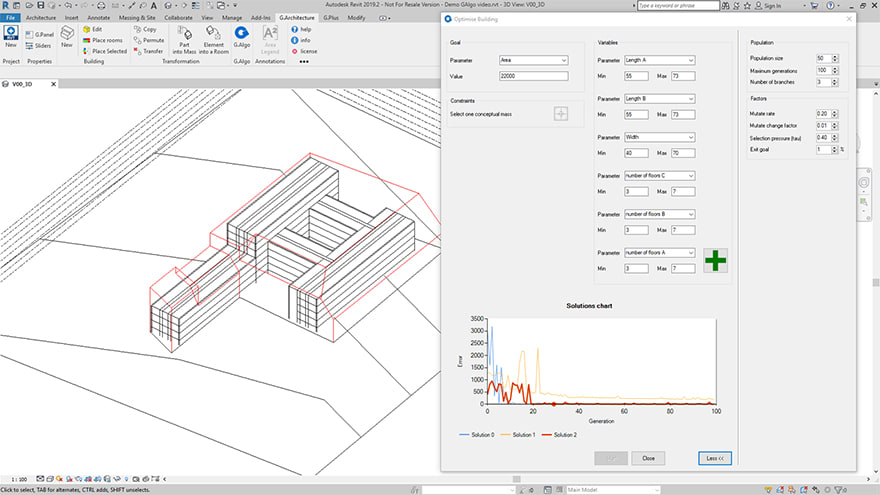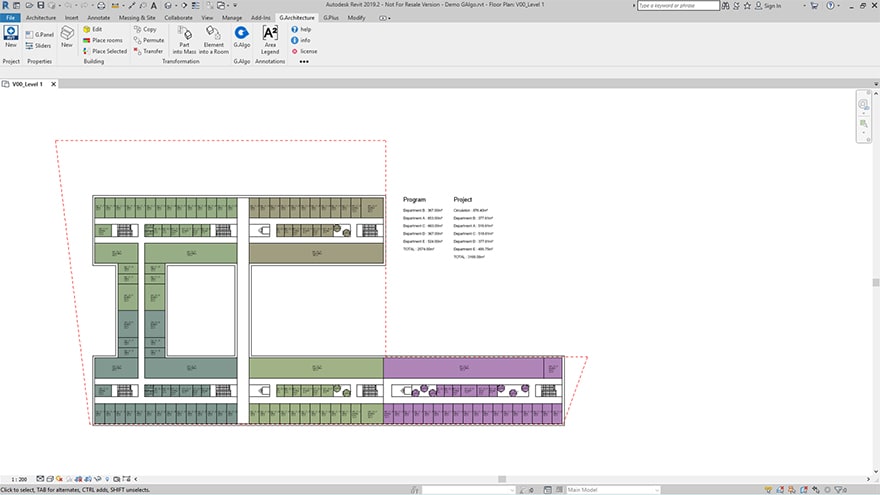A prototype generative design tool for BIM that uses AI to convert architects’ “sketches” into functional concept designs, is available to download as a trial for free.
G.Algo is the brainchild of tech start-up Etc-tec, a team of research architects and software engineers developing intuitive plug-ins for Revit that accelerate and optimise the early stages of design.
The tool features a simple interface, based on evolutionary algorithms, that allows users to sketch out rudimentary ideas and input basic project constraints, AI then calculates and simulates a series of optimal solutions.
Architectural firms in France and Spain are currently testing the tool on projects including hospitals and laboratories, and Etc-tec now wants other firms to apply it on projects and provide feedback to finalise the product for a commercial release.
Amilcar Ferreira, co-founder of Etc-tec and a former architect, told BIM+: “The problem with existing BIM software is that it is too rigid for the early feasibility design stages and generative design tools, like Dynamo, are very complex. G.Algo’s interface and workflows are simple and operate in a way that architects understand and are familiar with.”

An architect’s sketch in plan is automatically converted into a schematic plan with a 3D representation of a building

The tool automatically populates the plan with rooms and spaces
G.Algo aims to accelerate the production of formal schemes and functional diagrams. An architect’s sketch in plan is automatically converted into a schematic plan with a 3D representation of a building that can be associated with a specific building type, such as a hospital or a school.
The tool automatically populates the plan with rooms and spaces organised based on factors such as the requirement for sunlight, access to circulation etc. Other geometrical variables and project constraints can be input, such as urban rules, topography, facade area and costs, then the generative algorithm spits out a number of concept design options to appraise.
The number options produced and the level of detail is defined by the user in a toolbar and may involve a compromise between the needs of the project and the computing power available.
The number of generative options is less important than the differences between each one, says Ferreira: “If the architect allows for a lot of variables in the design it will result in greater variety in the concepts, if they impose numerous constraints then the options will be less diverse. Our intention is to enable a creative symbiosis whereby the experience and intuition of the architect guides the AI towards the best solutions.”
The plug-in integrates with architectural program information and can automatically populate areas and rooms with data on things like floor finishes and types of door or window.
The evolutive algorithm is able to “learn” architects’ preferences over time to improve designs. The ultimate aim is to scale it up using Big Data and potentially linking up with a large firm doing multiple projects to build up a strong understanding of their typical project requirements and user preferences to generate concepts tailored to their needs.
G.Algo is available to download as a six-month free trial from the Autodesk App Store (Etc-tec is an Autodesk Authorised Developer). A more up-to-date version can be trialled by contacting the firm direct http://etc-tec.com/.











